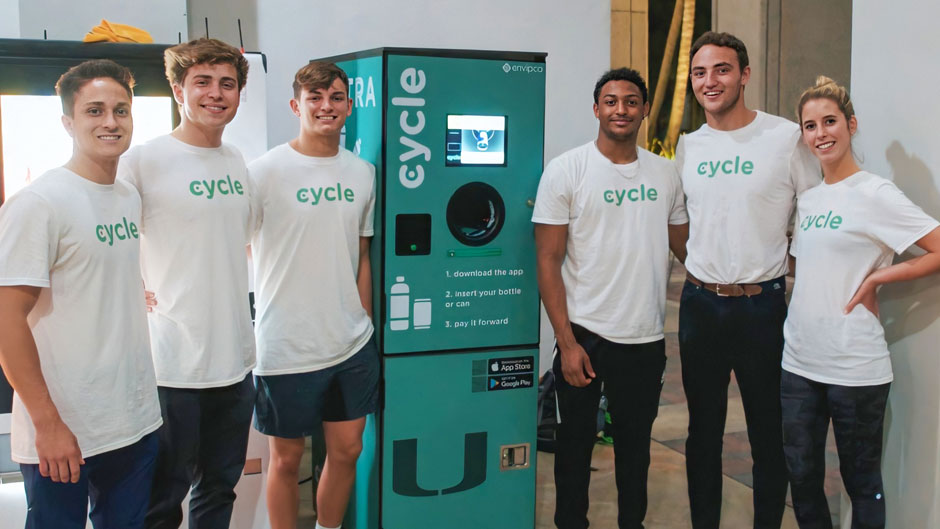The United States has a recycling problem and a team of University of Miami students are on a mission to solve it—starting with their institution’s Coral Gables campus.
When Anwar Khan and his roommate Connor Pohl were first-year students, they found themselves muddled about the process of recycling on and off campus. Wanting to streamline the process and encourage more of their peers to responsibly recycle, Kahn told his friends he wanted to provide a way for others to redeem plastic bottles for charity donations.
So, Khan teamed with his classmates and friends to create Cycle Technology—"a mobile application that provides users with financial rewards for recycling, gamifies sustainability to encourage user engagement, and allows users to direct their funds to sustainable development projects,” the company’s website states. The application pairs with a reverse vending machine (RVM) to facilitate the proper disposal of the recyclables.
“Everyone on this team is very passionate about the environment,” said Kahn, the company’s CEO and a junior majoring in environmental science with a double minor in chemistry and German. “It was less of a business prospect and more about how to solve an ecological issue.”
The team of 12—eight attend the University of Miami—just so happened to turn its idea into a profitable business. After placing third in the University’s 2019 Hult Prize competition, Assistant Dean EllenMarie McPhillip in the University of Miami Patti and Allan Herbert Business School encouraged the team to fine-tune their startup idea and enter more business competitions. Recently, the students won the trade and logistics category of the Miami Herald Startup Pitch Competition 2020.
“The University really provided us a ton of support, very early on,” said Pohl, who is the COO and a junior double majoring in economics and microbiology and immunology. “A lot of our early resources came from mentorship within the Miami Herbert Business School and The Launch Pad, which was really important and honestly helped a lot.”
The earth’s wellness has long been a priority to administration and faculty at the University of Miami. It can be seen in initiatives like the Student Government’s ECO Agency, established to advance an environmentally aware culture by promoting green habits.
Last summer, Cycle Technology team members met with Teddy Lhoutellier, sustainability manager for the University, for advice and data. Lhoutellier said that he was impressed by the students’ professionalism and maturity and connected them with key stakeholders on campus to further their plan.
“I'm so glad a small group of concerned and determined ’Canes are showing the way,” he said. “I'm thrilled to see our students thriving on sustainable entrepreneurship. They are real green entrepreneurs.”
Today, Cycle Technology has raised hundreds of thousands in seed capital to bring their idea to fruition. The company’s first reverse-vending machine was placed on campus in March 2020, just as students transitioned to remote learning because of the coronavirus pandemic.
The software in the machines allows users to insert as many plastic or aluminum items as they want (the more items, the more charity points rewarded). If any item inserted is contaminated, the machine will automatically reject it. The user then uses the Cycle Technology mobile application to scan the uniquely generated QR code, which will apply points to a charity of choice.
Cycle Technology’s growth strategy is focused on partnering with colleges and universities around the nation. Two campus directors from Boston College and Santa Clara University were recently hired to begin pilot programs on their respective campuses.
One of the four co-founders Noah Barrows, a finance and business technology major, is Cycle Technology's, Chief Financial Officer. He manages the company’s finances and coordinates with the business development team to build scalable financial models. Colin Hively, another original team member, and co-founder is instrumental in all fundraising efforts, investor relations, and the formation of strategic partnerships. Hively also works with the team on resource allocation and workflow design.
“It feels surreal,” said Pohl, referring to the partnership between Cycle Technology and the University. “It was a great experience working with the university’s leadership, facilities department, and the ECO Agency.”
John Tallon, executive director of facilities and operations, assisted with the students’ pilot program.
“Students on our campus have always shown a robust engagement when it comes to sustainability, but this took it to another level,” said Tallon. “This is an unprecedented partnership and as the support mechanism of the campus, we were happy to work with leadership to help install the machine.”
Harrison Mount, chief technology officer of Cycle Technology, is a senior double majoring in computer science and computer engineering. He said juggling a startup, with friends turned business partners, while being a full-time student has come with its challenges and its rewards.
“The dynamic is really interesting because there's much work to be done, and it's all a learning experience at the same time,” said Mount. “Balancing all of that with school is interesting, because we all have our own extracurriculars that we like to do—whether a club or sport or whatever.”
Julie Young, vice president of marketing and social media for the startup, said the mutual admiration for the environment makes the challenges they experience as a team worthwhile. Her advice to other college students looking to start a business while in college is clear.
“It can't be something that you think will make you money,” she said. “It has to be something that you're driven toward. Something that you think about all the time; something that you can see yourself continuing to do in the future,” she added. “Something that you're extremely passionate about. Don't fake it.”

